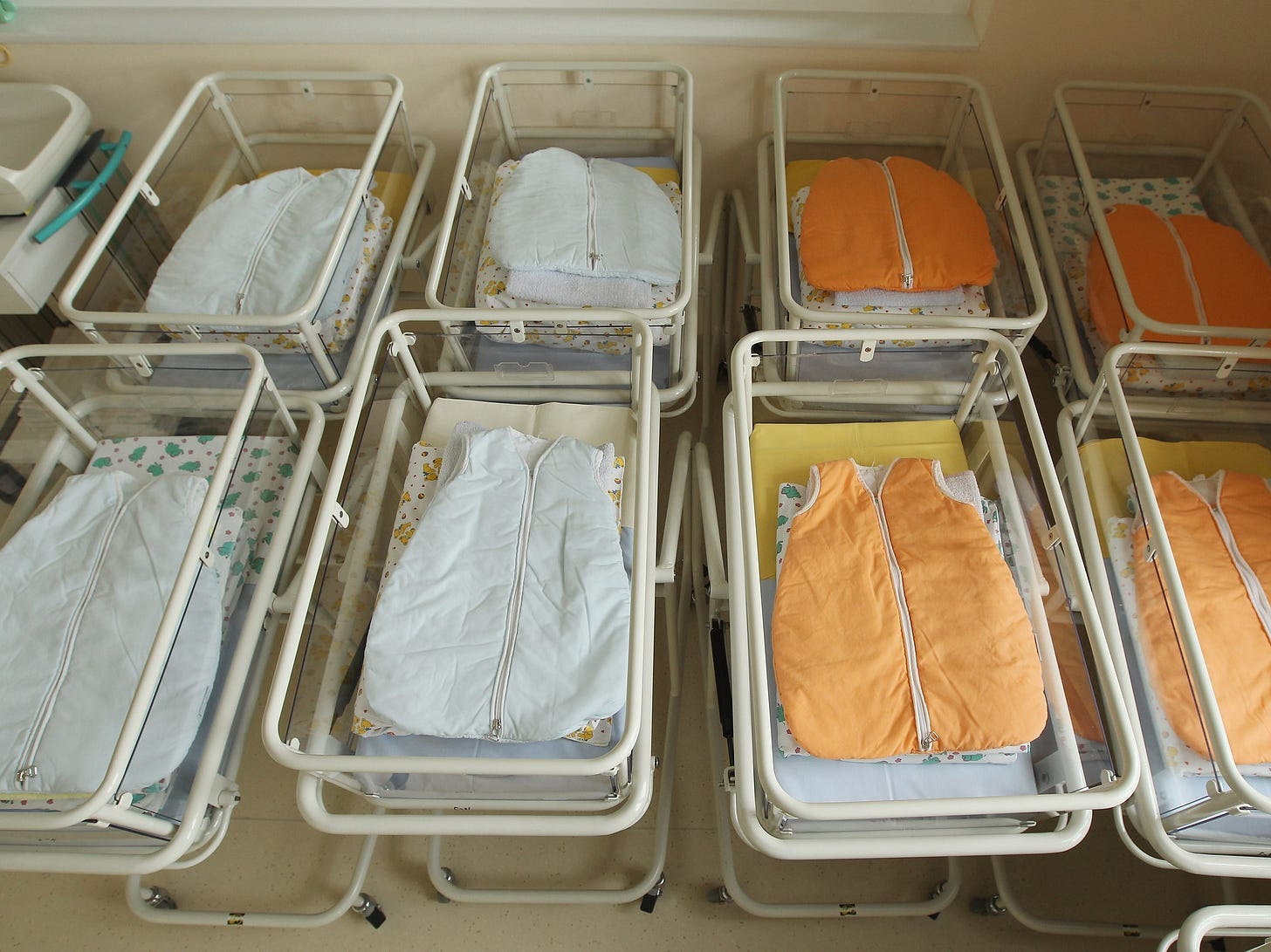If you want to save the world you have to have a lot of babies
If you figure out another way, let me know
“The birth of children,” Pope Francis said this week, “is the main indicator for measuring the hope of a people.” He is entirely correct. There are few things more hopeless, more fully devoid of hope, than a society without children: It is viewed quite properly as a dead place, addled, discordant, unsettling, and above all without hope. Hope requires a future continuous tense, which you simply cannot have without enough kids.
Italy, where Francis made these remarks, is facing what is effectively demographic self-annihilation: Last year there were about 300,000 more deaths than births in that country, a lethal imbalance that will accelerate into catastrophe without major corrective action. “Major corrective action” in this case, would be a bunch of women having a bunch of babies. That’s it, that’s the only way out of a spiral like that. It’s honestly very weird that it should be even a remotely difficult proposition. It used to be you didn’t have to work too hard to convince people to (a) have a bunch of sex and (b) make beautiful families that provide them with decades of love, happiness and support. This should be an easy sell. The Chamber of Commerce shouldn’t have to hustle too hard on this one. And yet nobody is really interested in doing that anymore. So you get a census in which hugely more people are dying than being born, and you see pontiffs and prime ministers openly begging people to start having kids again.
No hope: That’s a future without kids, in Italy and in much of the rest of the world. Even the U.S. birth rate is cratering; it’s well below “replacement rate,” in any event, which is the level at which you must have babies in order for your society to remain stable. The Pope has the right idea: You have to implore women to have more babies, to get married and have several children. He and Meloni understand the stakes; she herself called some years ago for “a grand plan to sustain the birth rate” (which of course didn’t materialize).
You can say this sort of thing in Italy, at least if oyu’re an outspoken pope or a firebrand prime minister. But how palatable is that kind of rhetoric throughout the rest of the world? What if you heard this from U.S. governors, mayors, senators, secretaries of federal departments? Imagine Kathy Hochul urging New York women to have more babies; imagine Xavier Becerra calling for a spike in the brith rate. It would go over like a lead balloon, because nobody really wants to hear that message on a wide scale. It’s too uncomfortable. It demands too much of people. Having babies is a serious business; it requires a lot of time, money, hard work, patience, love, self-denial, self-ablation; it brings with it sleeplessness, poop, vomit, frustration, fear, uncertainty, doubt. It is, of course, entirely worth it; the positives outweigh the negatives by several massive orders of magnitude. You simply cannot comprehend the sheer, life-changing, incalculable joy of having a child until you have one. But people are primed to focus on the negative, especially when it comes to childrearing in the 21st century. Younger generations have been taught that a baby is something to be feared, hated, mistrusted, despised, a nuisance that will get in the way of the authentic, whimsical, spontaneous life you have planned out for yourself. It’s just too much of a hassle.
I don’t think it’s much more cerebral than that. A Pew survey from 2021 found that, of the nearly half of American adults of childbearing age who don’t ever expect to have children, fully half of them said the reason they don’t want to have kids is they “just don’t want to.” That is, ironically, the kind of response you would expect from a child: “I just don’t want to!” The object in this case has become the subject, a cosmic irony that would be funny if we weren’t all headed toward something terrible: By refusing to have children, adults have become more like children themselves.
Collapsing fertility rates might be the biggest and most important story of our time, for the simple reason that the world as we know it was built on high fertility and cannot sustain itself with low fertility. The global baby bust will affect everyone in the entire world, and negatively so. Everything is changing. In 2006’s great and prescient “Children of Men,” one character reflects on that world’s mysterious and catastrophic collapse of fertility: “As the sound of the playgrounds faded, the despair set in.” As she observed: “Very odd, what happens in a world without children's voices.” Just you wait.




When I was having babies the preaching was all about world overpopulation, lack of resources, and how childless couples were just fine. The emphasis was on women going to work, women getting fulfilled at work, and the drudgery of babies. My two 30 something children are childless and not very interested. All the juggling and stress, even with a very involved father, may have been a bad example for them to want to follow. Too bad because babies are the best.
Amen.